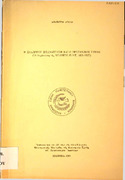Please use this identifier to cite or link to this item:
https://dspace.larlib.gr/handle/123456789/1473| Title: | Η Ελληνική Επανάσταση και ο βρετανικός τύπος : (η περίπτωση της Morning Post, 1821-1827) |
| Authors: | Λουλές, Δημήτρης |
| Keywords: | Τύπος, Βρετανικός -- 1821-1827, Βρετανικές εφημερίδες -- Ιστορία -- 1821-1827, Ελλάς -- Ιστορία -- Επανάσταση του 1821 -- Πηγές |
| Issue Date: | 1983 |
| Series/Report no.: | "Δωδώνη", Επιστημονική Επετηρίδα της Φιλοσοφικής Σχολής του Πανεπιστημίου Ιωαννίνων;ΙΒ΄ τόμος |
| Abstract: | Συμπερασματικά, με τα κριτήρια που τότε επικρατούσαν, ο απολογισμός του έργου της MORNING POST, κατά την ενημέρωση και το σχολιασμό των γεγονότων της Ελληνικής Επανάστασης του 1821, πρέπει να θεωρηθεί θετικός. Η αδιαφιλονίκητη συνέπεια της εφημερίδας στην ιδεολογία της και στις ταξικές της αρχές, επόμενο ήταν να αναστέλλει κάθε φιλελληνικη εκδήλωση από τις στήλες της - κάτι πού ενδεχόμενα θα προσδοκούσε ό σημερινός αναγνώστης - οποτεδήποτε ή πολιτική σκοπιμότητα το επέβαλε. Η ανεύρεση της χρυσής τομής ανάμεσα στους παράγοντες επηρεασμού τής κοινής γνώμης και στην έκφραση των απόψεων των άμεσων υποστηρικτών τής εφημερίδας, σαν ιδιαίτερη ευαισθησία και ευελιξία. Ή σχετική επιτυχία είναι και εδώ ο κανόνας· αυτό ισχύει απόλυτα στην περίπτωση της MORNING POST. Ωστόσο ό επίμονος αναγνώστης της πάντα θα διακρίνει και την ανώδυνη, φαινομενικά, αλήθεια χωρίς προκατάληψη… SUMMARY: The value of the Press as historical testimony as a rule is doubted. Nevertheless it can offer at times specific dimensions in historical research, espcially if one is able to read between the pines. The British Press-though in some ways independent from state control, since 1695 - followed the general rule - a newspaper above and foremost is the means of expression of the political and economic interests of the various fractions of the ruling classes. Henceforth all significant events likely to affect those interests were treated by the British Press according to pursuits and ideology of the patrons of each newspaper. The way in which the Press of Great Britain treated the Greek Revolution was more or less similar. To be sure one notices in the Press certain retrograssions and contradictions, which can be explained by the general uncertainty, an uncertainty reflected and conditioned by the almost permanently doubtful outcome of the Revolution. A typical example of this attitude is the editorial policy of MORNING POST, a conservative London newspaper, which, however, supported the rightwing Whigs. In this article we endeavour to give a sample analysis of the reaction of the MORNING POST as they are evinced in certain distinct aspects of the Greek Revolution, i.e. from its beginnings to the Battle of Nava-rino and the election οf I. Capodistrias as President of the new state. The quality of the kind of information provided by the MORNING POST is here discussed as well as its degree of credibility and impartiality; finally whether the newspaper succeeded in its aims, combining objective journalism with the interests and political views it expressed... |
| Description: | Άρθρο με περίληψη στα αγγλικά. |
| URI: | http://dspace.larlib.gr/handle/123456789/1473 |
| Appears in Collections: | ΑΝΑΤΥΠΑ |
Files in This Item:
| File | Description | Size | Format | |
|---|---|---|---|---|
| Η Ελληνική Επανάσταση και ο βρετανικός τύπος -η περίπτωση της Morning Post- 1821-1827- 938.5 ΛΟΥ-.pdf Until 2099-01-01 | 1.71 MB | Adobe PDF |  View/Open Request a copy |
Items in DSpace are protected by copyright, with all rights reserved, unless otherwise indicated.


